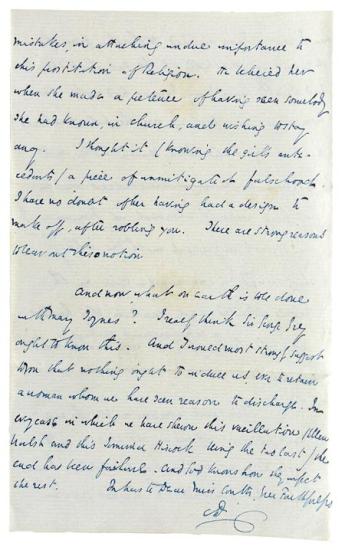
Autograph letter signed, London, 17 April 1850, to Angela Burdett-Coutts
Purchased with the assistance of the Fellows, 1951
Dickens came of age, professionally, as a political reporter at the time of the first Parliamentary Reform Act in 1832. He distrusted and despised most politicians, and once referred to the House of Commons as "that great Dust Heap down at Westminster." His own political position was broadly reformist, his main concern being the improvement of people's standards of living and the efficiency of government. In this letter he states his political faith: "The people will not bear for any length of time what they bear now.... For this reason solely, I am a Reformer heart and soul. I have nothing to gain—everything to lose (for public quiet is my bread)—but I am in desperate earnest, because I know it is a desperate case."
Philanthropy
From 1840 Dickens guided the charitable work of philanthropist Angela Burdett-Coutts (1814–1906), the wealthiest heiress in Victorian Britain. Dickens served as her official almoner and helped to assess the merits of the thousands of letters she received from those seeking financial assistance. He also advised on her plan for improved sanitation in the slums of Westminster and drew her attention and support to the Ragged School Union, which provided education to London's poorest children. A pragmatist, Dickens encouraged Burdett-Coutts to direct her philanthropy toward the causes of distress. In 1847 they founded a home, Urania Cottage, in Shepherd's Bush, as a shelter for homeless women—prostitutes or petty criminals who sought to rehabilitate themselves by learning practical skills and developing self-discipline. Many of the women were assisted to eventually emigrate to one of Britain's colonies to begin a new life. For more than ten years, Dickens administered Urania Cottage on behalf of Burdett-Coutts and played an extremely active role in its day-to-day management.
mistakes, in attaching undue importance to this prostitution of Religion. He believed her when she made a pretence of having seen somebody she had known, in Church, and wishing to stay away. I thought it (knowing the girl's antecedents) a piece of unmitigated falsehood. I have no doubt of her having had a design to make off, after robbing you. There are strong reasons to bear out this notion.
And now, what on earth is to be done with Mary Joynes? I really think Sir George Grey ought to know this. And I would most strongly suggest to you that nothing ought to induce us, ever to retain a woman whom we have seen reason to discharge. In every case in which we have shewn this vacillation (Ellen Walsh and this Jemima Hiscock being the two last) the end has been failure. And God knows how they infect the rest. In haste Dear Miss Coutts, Ever Faithfully Yrs.
CD.
